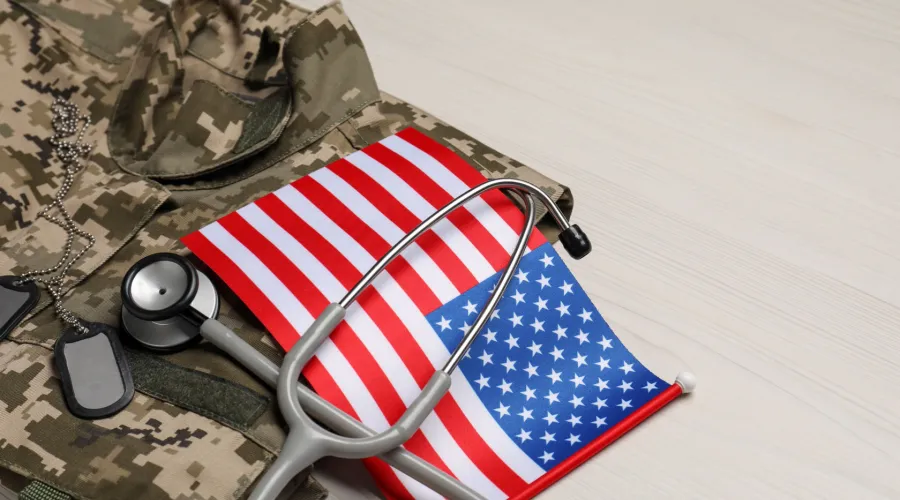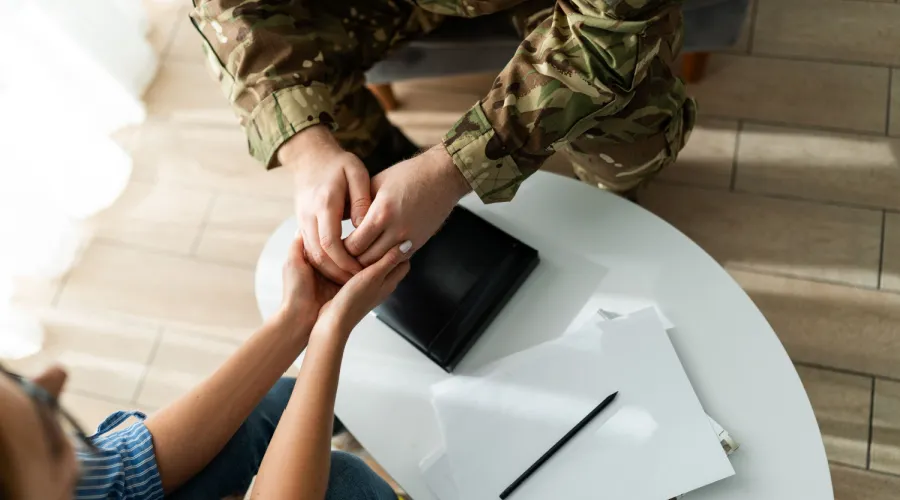Why Veterans Need Rehab Away from Home
Veterans face unique challenges when it comes to addiction and mental health, especially with substance use disorders involving alcohol. The transition from military to civilian life can be tough, with many struggling with PTSD, depression, chronic pain, or substance use disorders.
While local treatment centers are an option, traveling for rehab has many benefits that can make a big difference in recovery.
If you or a loved one is seeking addiction treatment, TricareRehabs can help you find drug rehab programs that cater to the specific needs of veterans.
What are the Benefits of Traveling for Rehab as a Veteran?
1. Specialized Veteran Treatment Programs
Not all rehab centers cater to veterans. By traveling for rehab you can choose a program designed specifically for former service members, so you get experts who understand military culture, PTSD, and co-occurring conditions like TBI. There are many options for treatment programs that specialize in helping veterans struggling with drug abuse.
2. Distance from Triggers and Negative Influences
Staying in your hometown for treatment may put you in environments and around people that contributed to your substance misuse or mental health struggles. Getting away from negative influences allows you to focus on healing without distractions.
When choosing a rehab center away from home, veterans should consider things like quality of care, types of therapy, and support systems.
3. Anonymity and Privacy
Seeking rehab can be overwhelming and some veterans may worry about the stigma around mental health and substance abuse. Traveling to a different city or state provides an extra layer of privacy so you can recover without being recognized by coworkers, neighbors, or acquaintances.
4. A Fresh Perspective and New Environment
A change of scenery can be therapeutic. Traveling for rehab allows you to get out of your comfort zone, and leave behind stressors and daily routines that may have contributed to your struggles. A fresh start in a peaceful and supportive environment can help with long-term recovery. Treatment time varies and a new environment can provide the structure and support to accommodate those individualized timeframes.
Choosing the Right Rehab Center for Veterans
When considering traveling for rehab it’s important to find a center that meets your needs. Here’s what to look for:
1. Veteran Specific Treatment Programs
Look for rehab centers with special programs that treat veterans and active-duty military personnel. These programs often include trauma-informed therapy, PTSD treatment, and coping skills for military life.
2. VA Approved and TRICARE Accepted Facilities
Many veterans rely on VA benefits or TRICARE insurance for medical care. Before you travel check if the rehab center accepts VA referrals or works with TRICARE to minimize out-of-pocket costs.
3. Total Mental Health and Addiction Support
Since many veterans have co-occurring disorders choose a rehab that offers dual diagnosis treatment. For veterans, co-occurring disorder treatment will target issues such as substance use and mental health conditions like PTSD, anxiety, or depression.
4. Holistic and Alternative Therapies
Some veterans benefit from alternative approaches like equine therapy, outdoor activities, or meditation. Look for a facility that offers holistic options alongside traditional therapy as part of your treatment plan.
5. Solid Aftercare and Relapse Prevention Plans
Recovery doesn’t end when rehab is over. Choose a rehab that has a good aftercare plan such as alumni programs, virtual counseling, and local support groups to maintain sobriety.
Substance Use Disorder Treatment for Veterans
1. Overview of Substance Use Disorder Treatment
Substance use disorder treatment for veterans is an individualized and comprehensive process that addresses the unique needs of each veteran. NIDA emphasizes the importance of evidence-based treatments like medication-assisted therapy (MAT) and behavioral therapies for long-term recovery.
Veterans can get treatment for their drug use through various providers including the Department of Veterans Affairs (VA) and private facilities. They can also use their insurance plan to cover most if not all of the costs of treatment. Tricare health care plans are a common option for veterans and offer coverage for several types of addiction treatment.
Tricare Rehabs works with several treatment programs for veterans including those with co-occurring mental health conditions. These programs address the complex interplay between addiction and mental health so veterans get the whole person care they need to fully recover.
2. Importance of Treating Co-occurring Health Conditions
Co-occurring mental health conditions like PTSD, depression, and anxiety are common among veterans with SUD. Addressing these conditions is key to successful recovery. The VA and other providers offer integrated treatment programs that treat SUD and co-occurring conditions. These programs may include counseling, therapy, and medication management.
By treating co-occurring conditions veterans can reduce their risk of relapse and improve their overall quality of life. Integrated treatment means veterans get whole-person care that addresses all aspects of their health and sets them up for a more stable recovery journey.
Reasons to Seek Rehab for Veterans with PTSD
Veterans with PTSD and SUD need specialized treatment that addresses both conditions at the same time. The VA and other providers offer evidence-based treatments like cognitive-behavioral therapy (CBT) and eye movement desensitization and reprocessing (EMDR) for veterans with PTSD and SUD. These treatments can help veterans process their traumatic experiences, manage their symptoms, and develop coping skills. Medication-assisted therapy (MAT) may also be used to manage PTSD and SUD symptoms.
Some veterans may prefer to get treatment at a private facility like AAC which offers a range of treatment programs and services specifically for veterans. These programs may include individual and group therapy, family counseling, and recreational activities. Private facilities provide a supportive and nonjudgmental environment where veterans can feel more comfortable and empowered throughout their recovery journey.
When talking to a provider about treatment options, veterans should ask:
- What treatment programs are available for PTSD and SUD?
- What is the length of stay for each program?
- What services are included in each program?
- Are there any specialized programs for veterans with co-occurring conditions?
- What is the cost of treatment and are there any financial assistance options available?
By asking these questions veterans can make informed decisions about their treatment and get the best possible care for their unique needs. This proactive approach helps veterans get the most effective and individualized treatment and sets them up for successful recovery.
Planning to Travel to Rehab in 5 Easy Steps
1. Check Your Benefits and Coverage
Contact a Tricare Rehabs representative to see what treatment options are covered and if out-of-state rehab facilities are covered by your insurance provider. We can help you quickly verify your insurance and go over the details of your plan.
This is an important step, as it can help you prepare to pay any out-of-pocket expenses ahead of time and ensure you are prepared for treatment.
2. Choose the Right Location for You
Some veterans prefer a rehab near nature, others in an urban area with job training and community resources. Tricare Rehabs representatives can discuss the different options available to you in terms of location, and help you determine what environment will best suit your recovery journey.
3. Make Travel Arrangements
Once you’ve chosen a rehab center, figure out how you’ll get there. Some facilities will assist with travel logistics including flights and transportation from the airport to the center.
4. Prepare for Your Stay
Rehab programs are typically 30-90 days. Pack comfortable clothes, medications, and any permitted personal items. Follow the rehab center’s guidelines on what to bring.
5. Notify the Necessary Parties
If employed, inform your employer about your leave under the FMLA (Family and Medical Leave Act) if applicable. If you have family responsibilities, arrange for childcare or pet care in advance.
Traveling for Rehab: 3 Potential Challenges to Overcome
1. Homesickness and Isolation
Being away from home can be tough but remember why you made this choice. Most rehab centers offer family therapy sessions and regular check-ins with loved ones to ease feelings of isolation.
2. Fear of the Unknown
It’s normal to feel anxious about a new environment but remember rehab is a place to heal. Veteran-specific programs mean you’ll be surrounded by people who understand what you’re going through.
One of the top reasons to travel for rehab is to get a fresh start remove yourself from triggers and negative influences in your current environment and enhance the recovery process.
3. Cost and Financial Concerns
Traveling for rehab can seem expensive but many programs work with VA benefits, grants, and scholarships. Some facilities even have sliding scale fees based on income.
Get Top Options Among TRICARE Treatment Centers Nationwide Now!
When it comes to rehab, traveling is a personal choice but for many veterans, it’s the way to long-term healing. If local treatment hasn’t worked for you in the past or you need to get away from triggers, maybe seeking treatment in a new location is the key to long-term recovery.
Put yourself first, look into your options, and take that first step to a healthier life free of addiction. Tricare Rehabs can help you determine whether you qualify for coverage for treatment, and provide access to specialized treatment facilities both in your local area and out-of-state.
We offer a private and convenient solution to those who are seeking addiction treatment and are willing to travel to get the help they need. Reach out to us to learn more today!
- EMDR Treatments for Substance Abuse in the Military - April 29, 2025
- Do Military Drug Tests Test for Alcohol? - April 1, 2025
- What is a Veteran Life Coach? - March 28, 2025




